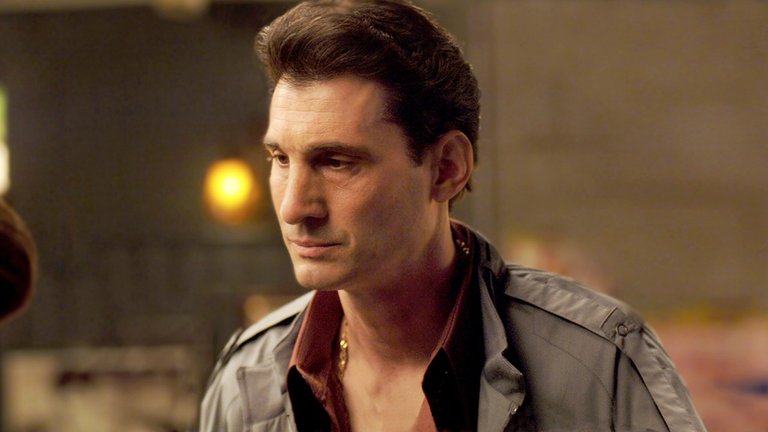
Members Only (S06E01)
Airdate: March 12th 2006
Written by: Terrence Winter
Directed by: Tim Van Patten
Running Time: 52 minutes
When The Sopranos returned for its sixth and final season in March 2006 after a near-two-year hiatus—a strategic pause mirroring the gaps between its later seasons—it faced the unenviable task of reacquainting viewers with its sprawling cast while advancing a narrative steeped in existential dread. Creator David Chase and his team approached this challenge with characteristic audacity, delivering a premiere that balanced thematic ambition with the series’ signature moral murkiness. Members Only, however, is a study in contrasts: a bold, often brilliant episode that occasionally buckles under the weight of its own self-conscious artistry. It re-establishes the show’s world with clinical precision, yet strains to marry its philosophical pretensions with the visceral storytelling that defined earlier seasons.
The episode opens with a bravura sequence set to Seven Souls, a spoken-word track by Bill Laswell featuring William S. Burroughs’ gravelly recitation of passages from his novel The Western Lands. Over images of characters in transitional states Burroughs muses on Ancient Egyptian concepts of the soul: the Ren (name), Ba (personality), and Ka (life force). The effect is both hypnotic and alienating. On one level, the montage efficiently updates viewers on two years of offscreen developments: Meadow’s stable relationship with Finn, AJ’s precarious college enrolment, Janice’s reluctant motherhood. Yet the juxtaposition of Burroughs’ esoterica with shots of Tony’s corpulent frame feels less like profundity than performative intellectualism. Chase, ever the provocateur, risks turning his blue-collar mob saga into a graduate seminar on Jungian archetypes—a choice that underscores the episode’s tension between accessibility and elitism.
Beneath the veneer of normalcy, Members Only meticulously plants seeds of disintegration. Carmela’s spec house, a metaphor for her aspirational self-delusion, is beset by bureaucratic delays and haunting dreams of the vanished Adriana La Cerva—a ghostly reminder of the family’s complicity in violence. Meadow and AJ, meanwhile, embody generational dissonance: the going through adulthood with unearned confidence, the latter floundering in collegiate apathy. Even Janice, now a mother, tempers her manipulative tendencies with a performative maternalism that fools no one.
Tony’s criminal empire appears equally secure, if tenuously so. A détente with the Lupertazzi family holds, thanks to Johnny Sack’s imprisonment-induced pragmatism and Tony’s uncharacteristic diplomacy toward the perpetually aggrieved Phil Leotardo. Yet this peace is illusory. Phil’s seething resentment over his brother’s death and Tony’s passive-aggressive concessions foreshadow the bloodshed to come. More insidiously, the episode reveals the rot within Tony’s ranks: informants like the late Ray Curto (whose fatal stroke mid-FBI debriefing borders on cosmic farce) and the doomed Eugene Pontecorvo.
Eugene’s arc encapsulates the episode’s central theme: the impossibility of escape in a world governed by arbitrary codes. His $2 million inheritance—a ticket to Florida sunshine and his son’s rehabilitation—is nullified by twin tyrannies. Tony, invoking the sacred “oath” of Cosa Nostra, denies his retirement request with Mafia doublespeak. Simultaneously, the FBI, desperate to replace Curto, strongarms Eugene into continued cooperation. Trapped between institutional and criminal exploitation, Eugene’s suicide by hanging (framed in chilling silence) is both inevitable and indicting. Chase renders this not as grand tragedy but bureaucratic banality: a man erased by systems he never chose.
The episode’s closing minutes deliver one of the series’ most audacious twists. Uncle Junior, his mind eroded by dementia, mistakes Tony for long-dead rival “Pussy Malanga” and shoots him in the stomach. Played as tragicomedy—Junior’s confusion, Tony’s wheezing crawl to the phone—the sequence subverts the operatic violence typical of mob narratives. This isn’t a hit ordered by rivals, but chaos emerging from senescence. Yet the cliffhanger ending (Tony’s fate unresolved) sparked controversy. For a show that had defied genre conventions—killing protagonists mid-season, denying cathartic resolutions—resorting to a “Who shot JR?”-style tease felt incongruous. Chase, ever contemptuous of audience expectations, seemed to be testing loyalists’ patience, weaponizing the very tropes he’d spent years deconstructing.
Members Only earned writer Terrence Winter an Emmy, and rightly so: its structural ambition and moral complexity reaffirmed The Sopranos as television’s most novelistic drama. Yet judged against the series’ zenith in previous season, it falters. The Burroughs prologue, while daring, distances viewers emotionally; Eugene’s storyline, though potent, lacks the visceral punch of Adriana’s demise or Tracee’s murder. Even Junior’s shooting, for all its shock value, prioritizes meta-narrative cheekiness over organic character development.
Ultimately, the episode epitomises The Sopranos’ final-season ethos: a work of art increasingly preoccupied with its own mortality. Like Tony himself—physically faltering, psychologically splintered—the show seems to ask whether any of us can truly escape the roles assigned to us. The answer, as Eugene’s swinging body and Tony’s fading gasps suggest, is written in the blood we pretend not to see.
RATING: 6/10 (++)
Blog in Croatian https://draxblog.com
Blog in English https://draxreview.wordpress.com/
InLeo blog https://inleo.io/@drax.leo
InLeo: https://inleo.io/signup?referral=drax.leo
Hiveonboard: https://hiveonboard.com?ref=drax
Rising Star game: https://www.risingstargame.com?referrer=drax
1Inch: https://1inch.exchange/#/r/0x83823d8CCB74F828148258BB4457642124b1328e
BTC donations: 1EWxiMiP6iiG9rger3NuUSd6HByaxQWafG
ETH donations: 0xB305F144323b99e6f8b1d66f5D7DE78B498C32A7
BCH donations: qpvxw0jax79lhmvlgcldkzpqanf03r9cjv8y6gtmk9
Posted Using INLEO
"Great analysis of 'Members Only'! Your dive into the episode's thematic depth and character dynamics is impressive. Love the humor in pointing out the 'cosmic farce' of Ray Curto's stroke. Keep up the insightful reviews!"